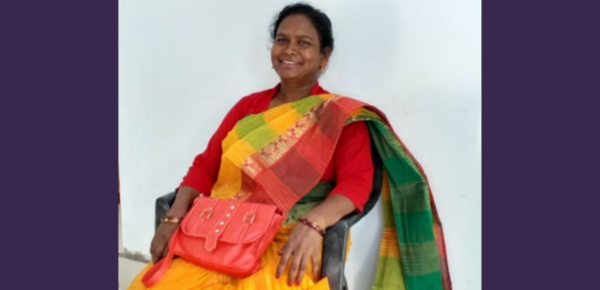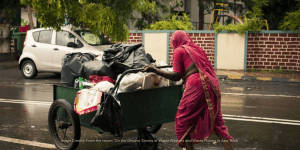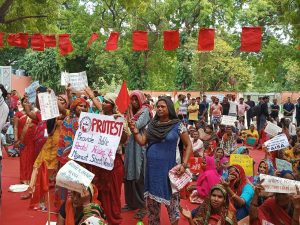Where Are The Equal Rights For Adivasi Women?

For Bitiya Murmu (40), a Santhal Adivasi woman leader in Jharkhand, personal has become political. For the last ten years, she has been fighting a long battle with her male relatives to claim her rightful share to her ancestral property- a struggle which has since transformed into a statewide advocacy for land, property and inheritance rights for all Adivasi women in the state.
Governed by unwritten customary laws, Adivasi women are not entitled to secure inheritance which pushes them into multiple levels of vulnerability within the society. In 1986, Juliana Lakra, an Oraon Adivasi woman filed a writ petition challenging the provisions in the Chotanagpur Tenancy Act (1908) that deny women equal rights to property. The Court had refused to strike down the provisions as violative of the right to equality under Articles 14 and 15, and the right to life under Article 21 of the Constitution.
Bitiya Murmu has been working in the Santhal Pargana region of Jharkhand to highlight the violence and unequal status of women in the Adivasi society. She leads the Ekal Nari Sangathan ( Single women’s collective) that advocates, among other things, women’s right to inherit land and property. She also heads Lahanti, a non government organisation that works in Dumka and Jamtara districts of Jharkhand.
In this interview, Bitiya Murmu talks to BehanBox about her personal struggle to claim her rights, the status of Adivasi women’s land rights and why this issue needs to be in the mainstream discourse of gender justice for Adivasi women.
What made you enter into women’s rights activism in Jharkhand? How do you see the status of Adivasi women within the society?
As an Adivasi woman, I had seen and experienced the ways in which the society deprived us of our rights. But one particular incident that I witnessed in 1997 angered me and changed the way I work. In Jamtara district ( then part of Dumka district in undivided Bihar), a Santhal Adivasi woman was tied to a bullock and made to till the fields by the village men. Her fault was that she had used the plough to till her land- something that was forbidden among the Adivasis. When some of us from our Self Help Group went to visit her, we were locked up in the village school the entire day. Men in the village said that any woman who touches the plough invokes the wrath of our gods and brings drought and misery to our society.
This incident made me question the place of women within the Adivasi society. We are always given to understand that the Adivasi society, which follows customary laws, is an egalitarian one where women had equal rights. While it is true in some ways, you will see how pervasive patriarchal notions are in our customary laws, when viewed through a gender lens.
Our Constitution guarantees equality of life, liberty and dignity. Where is all this for Adivasi women? I realised that things needed to change for Adivasi women and we needed to speak up.
You have personally been at the forefront of advocacy for land, property and inheritance rights for women in Jharkhand. Give us an idea of the current status of these rights for Adivasi women?
Customary tribal law as well as state-level laws like the Chotanagpur Tenancy Act (1908) and Santhal Pargana Tenancy Act discriminate against women in matters of succession.
It becomes particularly difficult for widowed or separated women with no sons to claim a share in her husband’s property. Society uses unimaginable ways to torture the woman to drive her away from her husband’s property. Older women are branded as witches and lynched.
Let me give you an example from my own family. After my father died, my paternal uncle tried to evict my mother from our house and capture our 23 Bighas of land. We are three sisters and my mother had no sons. He attacked and tortured her but she remained steadfast- mainly because she had nowhere else to go.
“Agar maar dijiyega toh maar he dijiye”- Kill us if you want to, she told them.
In many ways I admire my mother. She was a very brave woman. When they saw that she was not leaving they tried other tricks.
What other methods did they use to evict her?
The roof of our house was crumbling, so my mother wanted to engage labour to repair it. My uncle and the other men said that if any man from outside the family climbs up to the roof, they would kill him. They thought if the roof crumbled, we would leave on our own. We were threatened not to go out of the village to report as well.
See how the society conceives of ways to drive vulnerable women away? How can women live safely in a society like this?
Did your uncle leave your mother and the family alone because she refused to give up?
(Laughs) Oo log etna asaani se chodhega? (will they give up so easily?)
First, they put a load of pressure on my mother to get me married after my older sisters. I was only 13. My mother refused until I had completed my matric exams. But after a point, she had to give in to the pressure. They thought that once all of us were gone, they could drive her away. Until my mother was alive, they took hold of half our lands. After her death in 2010, they took all of it.
After I separated from my husband and returned home, my uncles would not allow me to till our own lands. They said I had no rights in the property and lands that belonged to my parents.
What did you do then? I have a feeling you did not give up too, just like your mother.
Yes. As per customary laws, I had to approach the village head. As it happened, Pradhan (head) of our village was the same uncle of mine who was after our lands. So he refused. Next step in the process was to get 100 village chiefs from the nearby villages- known as ‘Modhe Manjhi’- for a hearing in the case. They ruled that the land title had my parents’ name and I was entitled to it. That was encouraging. But the police are causing the delay in my claim as it has imposed the section 107 to maintain peace and calm in the village.
I have filed a case in the district court to challenge this but not on the land title. Courts say that because we follow customary laws, they will not be able to intervene. This is where everything gets stuck.
 [Photo Courtesy: Bitiya Murmu]
[Photo Courtesy: Bitiya Murmu]How are customary laws being a hurdle for women’s land and property rights?
Customary laws are not codified or written. So the judgements are based on whim and notions of power. If a person in power decrees, as my uncle who is the Pradhan of the village did, the verdict will always be a personal one.
When people say adivasi women get their rights as per customary laws, what is the basis of that claim? How can we claim our rights? I am not against customary laws. We need to preserve our laws. But if you look at them from the lens of gender justice, women have a very reduced space in these laws.
Is there any written provision anywhere, maybe as part of another law, on the basis of which Adivasi women can claim their inheritance rights?
Section 20 of the Santhal Pargana Tenancy Act (1949) enacted during the British says that a daughter could inherit her father’s property if he gets a written permission from the District Magistrate to allow a Ghar Jamai ( son-in-law who lives with his wife’s family). See how patriarchal this provision is. Women’s land rights are encapsulated within their relationships with men. What if the father dies before the daughter gets married as it happened in my case?
“Log samajtha hai ki aurat toh apne saural mein gujar basar kargei. Gujar basar aur haqq mein antar hona chahiye ki nahin?”- People assume that a woman’s life should be spent in her marital household. Should we not distinguish a woman’s right and her life.
Look at the British who are considered progressive. Even they failed to see women as independent people with agency and rights. If they had written anything, we could have asked on that basis (laughs).
“Angrez log bhi anyay na kiya hai hamare saath aur usi ka duhai hum dete hai.” Even the British were unjust to us and we sing praises of their laws.
Our people say this law is made by the British and we should not tinker with it. I say this is very convenient.
Has anyone ever challenged Adivasi women’s land and inheritance rights in a legal process?
Juliana Lakra, an Oraon Adivasi woman filed a writ petition in the Supreme Court in 1986. She challenged the provision in the Chota Nagpur Tenancy Act (1908) which gave property rights to male heirs as violating the Right to Equality under the constitution. The Supreme court at the time asked the Bihar Tribal Consultative Council to examine the issue and submit a report. The council submitted a report in 1992 which said that ‘they were not in favour of effecting any change in the provisions of the Act, as the land of the tribals may be alienated, which will not be in the interest of the tribal community at present.’ Basically, they said that when tribal land is transferred to women, they will not be able to safeguard it and pass it on to non tribals.
[The majority judgment of the court refused to strike down the provisions as violative of the right to equality under Articles 14 and 15, and the right to life under Article 21 of the Constitution. The court, however, ruled that female relatives of the last male tenant could hold the land as long as they remain dependent on it for their livelihood.]
What are the social and economic consequences of Adivasi women not getting their land and property rights?
Women, especially single, divorced and widowed women are vulnerable when their property rights are not secure. They are having to migrate to find sustenance and are vulnerable to trafficking This is a very bad consequence. Jharkhand has one of the highest rates of women migrating as domestic workers to other parts in India.
Women live in constant fear of discrimination, harassment and ostracization from society. We do not know what insinuations society will hurl at us. We are not allowed to touch a plough, to stay in our parents’ house, till on our lands. Society is pushing us to the margins.The absolute worst is when women are branded as witches.
Are women who live with their husbands as Ghar Jamais better off than single women?
Not really. Even they are subject to different forms of discrimination. The woman and her children are put through so much stress. Anyway, they cannot apply for jobs of Anganwadi Sevikas or para teachers because only wives of male residents of the village can avail of these jobs. Recently, when we were creating awareness in 100 Gram Sabhas on community forest rights claims, Pradhans in majority of villages told me that they would not want the Ghar Jamais to have a share in these. These lands are Commons- for grazing animals, building ponds and other common uses. So I asked them if they would stop their cattle from grazing or drinking water from these ponds. They had no answer.
Are women claiming property rights branded as witches? What are the legal and punitive measures against this?
Single women, not necessarily only those claiming property rights, are branded as witches. If they see a woman speaks her mind, she becomes a target. If something bad happens in the village, she becomes the target. Why are superstitions always targeted towards women? What custom is this that treats us women like this? Are there no human rights for us?
In Jharkhand, there is a growing trend of public lynching of those branded as witches, because it is difficult to arrest a large number of people. Four months ago, three women were tied to a tamarind tree and publicly lynched after being branded as witches in Gumla district. Jharkahnd has a Prevention of Witch-hunting (Dayan Pratha) Act 2001, which we borrowed from Bihar. But the punishment is very light for these offences, a maximum of Rs 2000 fine and 1 year of imprisonment.
[Bihar was the first state in India to pass a law preventing witch hunting practices in 1999. While there is no national level law against witch hunting, Jharkhand, Chattisgarh, Odisha, Maharashtra, Rajasthan and Assam have state level laws prohibiting the gruesome practice.]
Do you see the issue of women’s land and inheritance rights becoming a mainstream issue within the Adivasi community and also a political one? What are your demands?
We have been working at creating legal, social and political awareness among Adivasi women. We have formed the Ekal Naari Sangathan in Jharkhand and we have 2 streams- one in the Santhal Parganas and the other in Chotanagpur region. It is absolutely necessary to codify the customary laws and fortify the gender rights aspects of these laws. This has been our longstanding demand.
During 2014 elections, we had campaigned hard to get this agenda into the manifesto of political parties. They did put something on violence against women but remained silent on land rights. It is a contentious issue that political parties do not want to touch. During these elections, we have been holding meetings of women in villages and we had collectively decided that we will vote for a party that has our land rights in their manifesto. But no party has included it this time as well.
Within the Adivasi society also, this is a very contentious issue as Juliana Lakra’s case showed us. But I see that the silence is being broken in recent times with a lot of social movements and organisations raising the issue.
“Ab mahaul ban raha hai”- the momentum is building now.
We believe everyone deserves equal access to accurate news. Support from our readers enables us to keep our journalism open and free for everyone, all over the world.




